National Security Law in Hong Kong requires unified standards in law enforcement
By Chen Qingqing and Bai Yunyi Source:Global Times Published: 2020/5/29 16:08:40 Last Updated: 2020/5/29 22:55:10

Regina Ip Lau Suk-yee Photo: Zhao Yu/GT
ditor's note:In the latest working report of the National People's Congress Standing Committee, it urged to accelerate the formulation of the national security law for Hong Kong Special Administrative Region (SAR) and improve the NPC Standing Committee's interpretation mechanism of the Basic Law in order to establish and improve state-level legal and law enforcement mechanism for safeguarding national security in the SAR. While the upcoming national security law has become a highly anticipated legislation for the Hong Kong society, the city's former security secretary talked with the Global Times in a recent exclusive interview about what are major concerns when the law comes into force.

Chinese lion statue at Victoria peak, the famous viewpoint and tourist attraction in Hong Kong Photo: VCG
To ensure Hong Kong's upcoming national security law is implemented effectively, Hong Kong should unify trial standards for judges at all levels, and tenured judges should adhere to more detailed ruling principles to ensure all judges are truly politically neutral and adjudicate in accordance with regulations, a former Hong Kong security secretary told the Global Times.
The National People's Congress (NPC) voted on Thursday at the closing of the third session of the 13th NPC to pass a draft decision on establishing and improving the legal system and enforcement mechanisms for the Hong Kong Special Administrative Region (HKSAR) to safeguard national security. The decision reflects the strong will and determination of the central government and Chinese people to safeguard sovereignty, which will not be deterred by mounting external pressure, some observers said.
The decision will be followed by an accelerated formulation of the law, which is expected to take effect in Hong Kong through the Annex III of the Basic Law. State-level national security departments are expected to establish special agencies in the SAR, and both central and local-level law enforcement mechanisms are expected to coordinate to enhance law enforcement, cracking down on acts and activities endangering national security.
Unifying standards
Though further details concerning the implementation of the law, law enforcement and judiciary work remain unclear, former Hong Kong Security Secretary Regina Ip Lau Suk-yee told the Global Times that if the judicial work is entrusted to existing courts in Hong Kong, the chief justice of the Court of Final Appeal should promulgate further ruling principles, demanding all judges comply with those principles in order to solve the issue of varying judgment standards. In addition, concerning national security matters, "the judgments should have a sufficient deterrent effect," Ip said.
She said the issue of varying standards has been more prominent within the jurisdiction of the District Court, noting that judges of the Hong Kong Court of Final Appeal respect three major principles including the Basic Law, the Chinese Constitution and the legal interpretation of the NPC.
"The nationality of judges is not the core issue. The most important point is that all judges should remain politically neutral and strictly follow legislation to make judgments," she said in response to some media reports claiming the new national security law would bar foreign judges from handling national security trials.
The planned national security legislation for Hong Kong is set to block its foreign judges from handling national security trials, Reuters said in a recent report, citing people familiar with the matter.
Fixing legal loopholes
The delayed passage of Article 23 of the Basic Law is widely believed to have become a major factor that has led to relentless radical protests in the city since last year, which has engulfed the once-prosperous Asian financial hub and plunged it into long-term recession.
As a local official who made efforts to push forward the Article 23 under the Basic Law in 2003, Ip said the Hong Kong SAR's failure to push the legislation was down to a "matter of determination."
"It's hard to say when it was the best time for formulating local national security laws. During the past 17 years, there have been some good situations [like economic recovery and eased shortage of the land]. Why did Hong Kong not take the chance to formulate its own laws?" the former security secretary asked.
"The central government has no choice but to step in. It's a pity [that we failed to establish the Article 23]," she said.
The Article 23 of the Basic Law stipulates the Hong Kong SAR shall enact national security laws on its own. But it has been almost 23 years since Hong Kong's return to China, and the Hong Kong SAR has failed to enact such laws.
Ip admitted she had taken relatively moderate approaches to dealing with relevant legislation proposals by taking a wide range of opinions into account, including those from citizens, lawyers and foreign associations.
"A major shortcoming was little consideration to how to deal with domestic terrorism and foreign intervention," she said, noting that even if Article 23 was established, the law would require amendments given the rise of secessionism over the past year.
Focusing on domestic terrorism
Over the months-long anti-government protests in Hong Kong in 2019 the Hong Kong Police Force saw the rise of terrorism in the city, one of the world's safest places. And the city's homegrown terrorism, connected with separatists and secessionists advocating "Hong Kong independence," has now posed a great threat to the city and the nation, observes noted.
The upcoming national security law for Hong Kong includes terrorist activities in its scope for conviction. Hong Kong's current response to terrorism mainly relies on the UN Anti-Terrorism Measures Act passed in 2002, which does not specifically concern local terrorists and has created loopholes in national security, Ip said.
"Some violent acts occurred last year including the storage of large amounts of explosives, the destruction of major infrastructure like tunnels and bridges. The acts can be considered terrorism, embedded with political demands," she said, acknowledging there might be objections toward the upcoming law but that the majority of Hong Kong fully welcomes it as the city is tired of chaos.

Posted in: HK/MACAO/TAIWAN